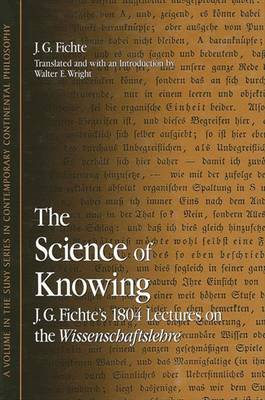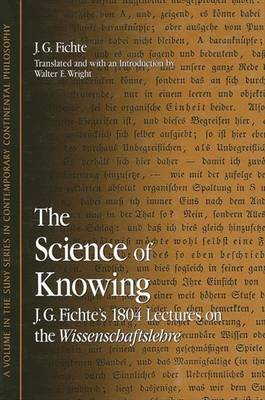
- Afhalen na 1 uur in een winkel met voorraad
- Gratis thuislevering in België vanaf € 30
- Ruim aanbod met 7 miljoen producten
- Afhalen na 1 uur in een winkel met voorraad
- Gratis thuislevering in België vanaf € 30
- Ruim aanbod met 7 miljoen producten
Zoeken
€ 53,45
+ 106 punten
Uitvoering
Omschrijving
Considered by some to be his most important text, this series of lectures given by Johann Gottlieb Fichte (1762-1814) at his home in Berlin in 1804 is widely regarded as the most perspicuous presentation of his fundamental philosophy. Now available in English, this translation provides in striking and original language Fichte's exploration of the transcendental foundations of experience and knowing in ways that go beyond Kant and Reinhold and charts a promising, novel pathway for German Idealism. Through a close examination of this work one can see that Fichte's thought is much more than a way station between Kant and Hegel, thus making the case for Fichte's independent philosophical importance.
The text is divided into two parts: a doctrine of truth or reason, and a doctrine of appearance. A central feature of the text is its performative dimension. Philosophy, for Fichte, is something we enact rather than any discursively expressible object of awareness; a philosophical truth is not expressible as a set of propositions but is a spontaneous inwardly occurring realization. Therefore, he always regards the expression of philosophy in words as strategic, aiming to ignite philosophy's essentially inward process and to arouse the event of philosophical insight.
The new translation contains a German-English glossary and an extensive introduction and notes by the translator.
The text is divided into two parts: a doctrine of truth or reason, and a doctrine of appearance. A central feature of the text is its performative dimension. Philosophy, for Fichte, is something we enact rather than any discursively expressible object of awareness; a philosophical truth is not expressible as a set of propositions but is a spontaneous inwardly occurring realization. Therefore, he always regards the expression of philosophy in words as strategic, aiming to ignite philosophy's essentially inward process and to arouse the event of philosophical insight.
The new translation contains a German-English glossary and an extensive introduction and notes by the translator.
Specificaties
Betrokkenen
- Auteur(s):
- Vertaler(s):
- Uitgeverij:
Inhoud
- Aantal bladzijden:
- 270
- Taal:
- Engels
- Reeks:
Eigenschappen
- Productcode (EAN):
- 9780791464502
- Verschijningsdatum:
- 5/07/2005
- Uitvoering:
- Paperback
- Formaat:
- Trade paperback (VS)
- Afmetingen:
- 154 mm x 230 mm
- Gewicht:
- 371 g

Alleen bij Standaard Boekhandel
+ 106 punten op je klantenkaart van Standaard Boekhandel
Beoordelingen
We publiceren alleen reviews die voldoen aan de voorwaarden voor reviews. Bekijk onze voorwaarden voor reviews.








